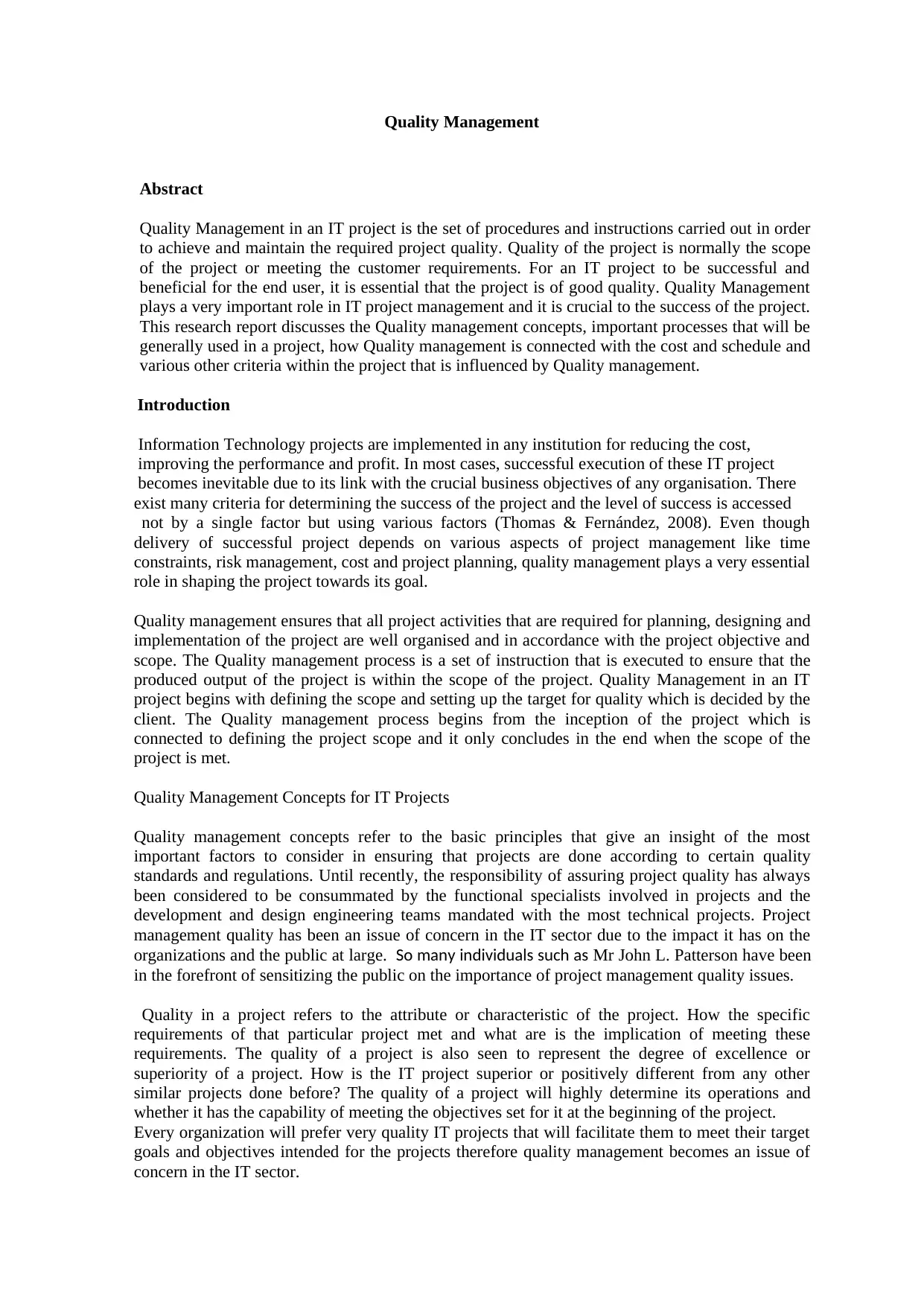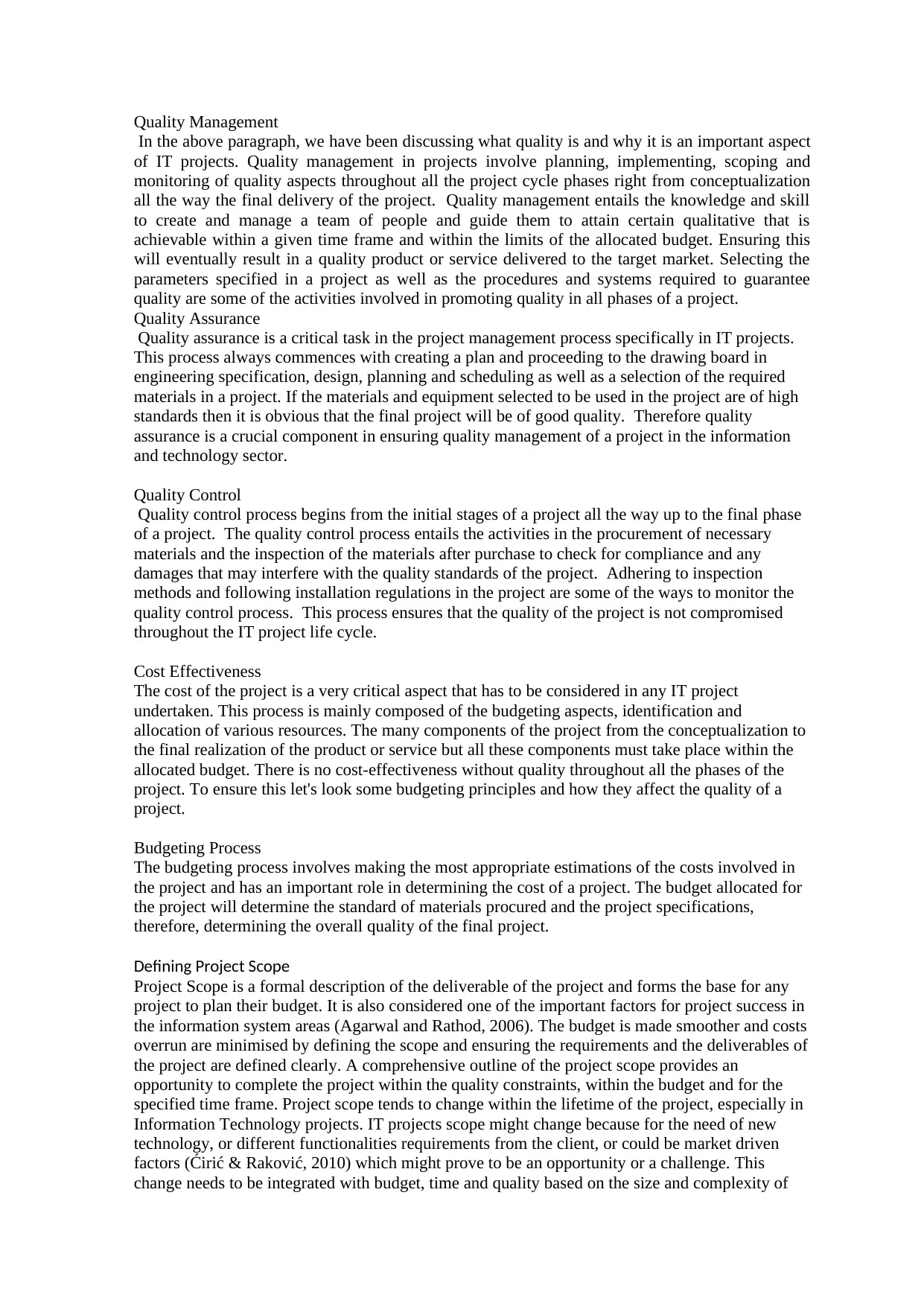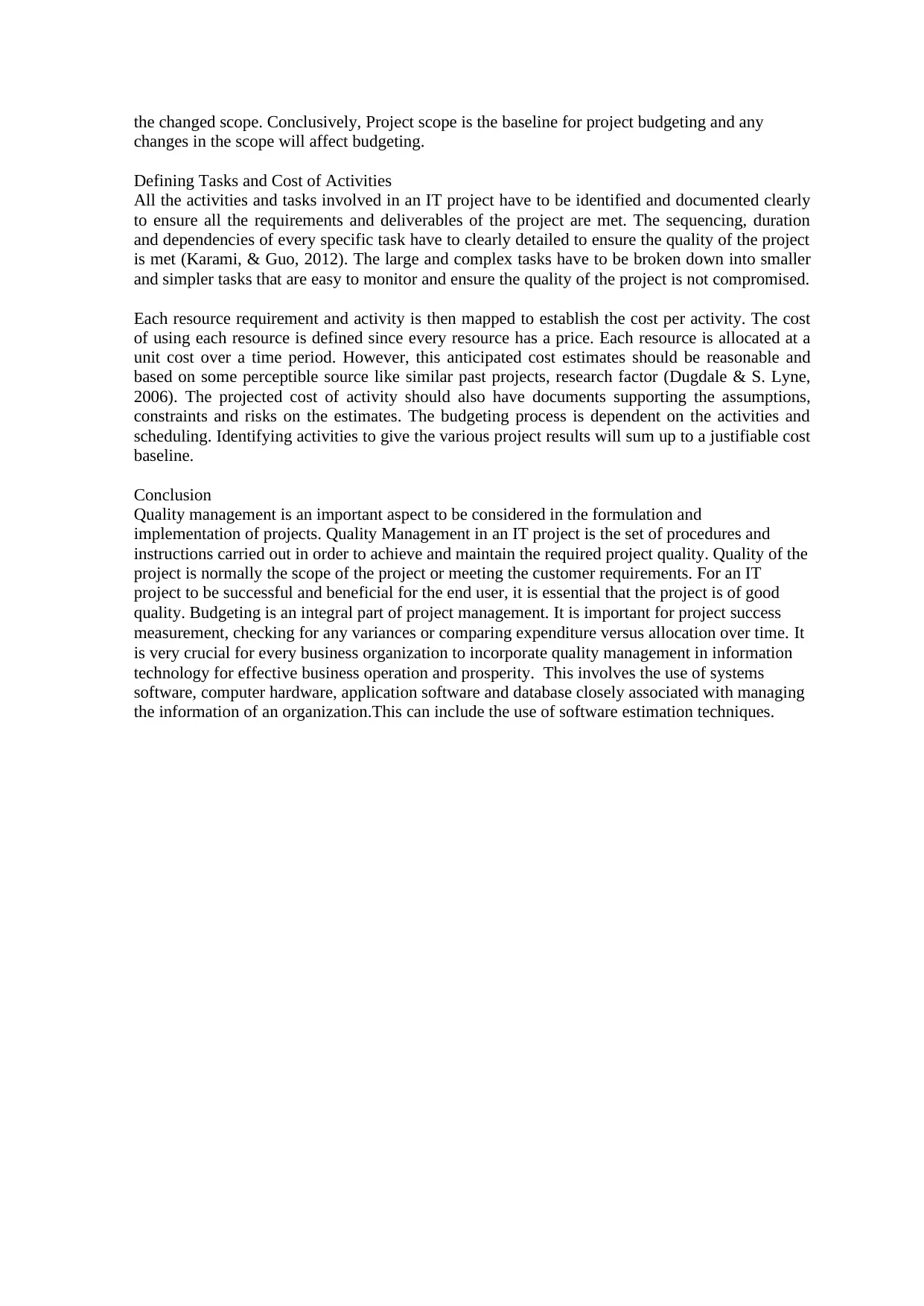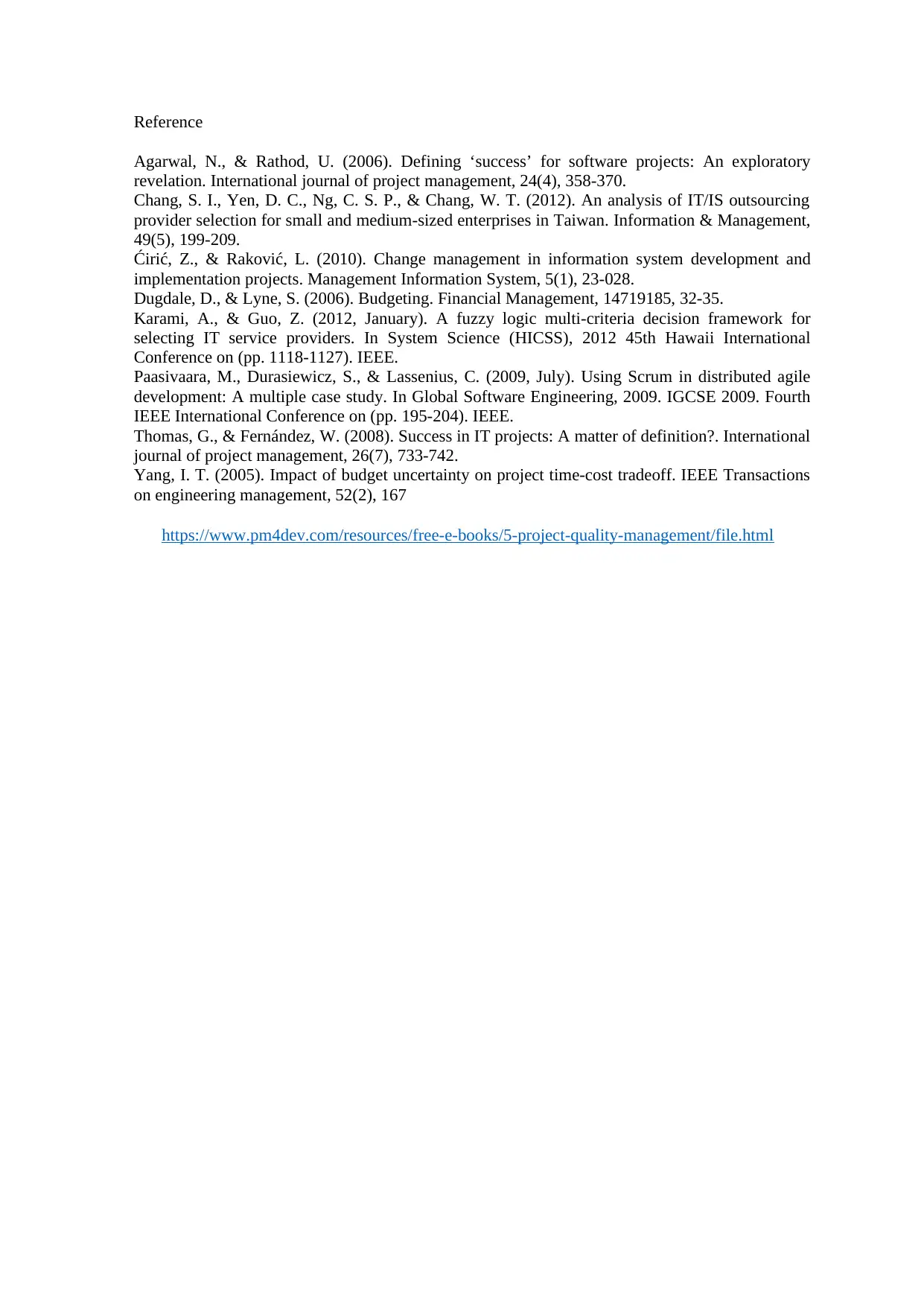IT Project Quality Management: Processes, Cost, and Schedule
VerifiedAdded on 2023/06/12
|4
|2088
|94
Report
AI Summary
This report provides an overview of quality management in IT projects, emphasizing its importance in achieving project success and meeting customer requirements. It discusses key quality management concepts, including quality assurance and control, and explores how these processes are connected to project cost and schedule. The report also examines the role of cost-effectiveness, budgeting, and project scope definition in ensuring quality throughout the project lifecycle. It highlights the need for comprehensive planning and monitoring to maintain quality standards and deliver successful IT projects. Desklib offers students access to this assignment and a wealth of other solved assignments and study resources.

Quality Management
Abstract
Quality Management in an IT project is the set of procedures and instructions carried out in order
to achieve and maintain the required project quality. Quality of the project is normally the scope
of the project or meeting the customer requirements. For an IT project to be successful and
beneficial for the end user, it is essential that the project is of good quality. Quality Management
plays a very important role in IT project management and it is crucial to the success of the project.
This research report discusses the Quality management concepts, important processes that will be
generally used in a project, how Quality management is connected with the cost and schedule and
various other criteria within the project that is influenced by Quality management.
Introduction
Information Technology projects are implemented in any institution for reducing the cost,
improving the performance and profit. In most cases, successful execution of these IT project
becomes inevitable due to its link with the crucial business objectives of any organisation. There
exist many criteria for determining the success of the project and the level of success is accessed
not by a single factor but using various factors (Thomas & Fernández, 2008). Even though
delivery of successful project depends on various aspects of project management like time
constraints, risk management, cost and project planning, quality management plays a very essential
role in shaping the project towards its goal.
Quality management ensures that all project activities that are required for planning, designing and
implementation of the project are well organised and in accordance with the project objective and
scope. The Quality management process is a set of instruction that is executed to ensure that the
produced output of the project is within the scope of the project. Quality Management in an IT
project begins with defining the scope and setting up the target for quality which is decided by the
client. The Quality management process begins from the inception of the project which is
connected to defining the project scope and it only concludes in the end when the scope of the
project is met.
Quality Management Concepts for IT Projects
Quality management concepts refer to the basic principles that give an insight of the most
important factors to consider in ensuring that projects are done according to certain quality
standards and regulations. Until recently, the responsibility of assuring project quality has always
been considered to be consummated by the functional specialists involved in projects and the
development and design engineering teams mandated with the most technical projects. Project
management quality has been an issue of concern in the IT sector due to the impact it has on the
organizations and the public at large. So many individuals such as Mr John L. Patterson have been
in the forefront of sensitizing the public on the importance of project management quality issues.
Quality in a project refers to the attribute or characteristic of the project. How the specific
requirements of that particular project met and what are is the implication of meeting these
requirements. The quality of a project is also seen to represent the degree of excellence or
superiority of a project. How is the IT project superior or positively different from any other
similar projects done before? The quality of a project will highly determine its operations and
whether it has the capability of meeting the objectives set for it at the beginning of the project.
Every organization will prefer very quality IT projects that will facilitate them to meet their target
goals and objectives intended for the projects therefore quality management becomes an issue of
concern in the IT sector.
Abstract
Quality Management in an IT project is the set of procedures and instructions carried out in order
to achieve and maintain the required project quality. Quality of the project is normally the scope
of the project or meeting the customer requirements. For an IT project to be successful and
beneficial for the end user, it is essential that the project is of good quality. Quality Management
plays a very important role in IT project management and it is crucial to the success of the project.
This research report discusses the Quality management concepts, important processes that will be
generally used in a project, how Quality management is connected with the cost and schedule and
various other criteria within the project that is influenced by Quality management.
Introduction
Information Technology projects are implemented in any institution for reducing the cost,
improving the performance and profit. In most cases, successful execution of these IT project
becomes inevitable due to its link with the crucial business objectives of any organisation. There
exist many criteria for determining the success of the project and the level of success is accessed
not by a single factor but using various factors (Thomas & Fernández, 2008). Even though
delivery of successful project depends on various aspects of project management like time
constraints, risk management, cost and project planning, quality management plays a very essential
role in shaping the project towards its goal.
Quality management ensures that all project activities that are required for planning, designing and
implementation of the project are well organised and in accordance with the project objective and
scope. The Quality management process is a set of instruction that is executed to ensure that the
produced output of the project is within the scope of the project. Quality Management in an IT
project begins with defining the scope and setting up the target for quality which is decided by the
client. The Quality management process begins from the inception of the project which is
connected to defining the project scope and it only concludes in the end when the scope of the
project is met.
Quality Management Concepts for IT Projects
Quality management concepts refer to the basic principles that give an insight of the most
important factors to consider in ensuring that projects are done according to certain quality
standards and regulations. Until recently, the responsibility of assuring project quality has always
been considered to be consummated by the functional specialists involved in projects and the
development and design engineering teams mandated with the most technical projects. Project
management quality has been an issue of concern in the IT sector due to the impact it has on the
organizations and the public at large. So many individuals such as Mr John L. Patterson have been
in the forefront of sensitizing the public on the importance of project management quality issues.
Quality in a project refers to the attribute or characteristic of the project. How the specific
requirements of that particular project met and what are is the implication of meeting these
requirements. The quality of a project is also seen to represent the degree of excellence or
superiority of a project. How is the IT project superior or positively different from any other
similar projects done before? The quality of a project will highly determine its operations and
whether it has the capability of meeting the objectives set for it at the beginning of the project.
Every organization will prefer very quality IT projects that will facilitate them to meet their target
goals and objectives intended for the projects therefore quality management becomes an issue of
concern in the IT sector.
Paraphrase This Document
Need a fresh take? Get an instant paraphrase of this document with our AI Paraphraser

Quality Management
In the above paragraph, we have been discussing what quality is and why it is an important aspect
of IT projects. Quality management in projects involve planning, implementing, scoping and
monitoring of quality aspects throughout all the project cycle phases right from conceptualization
all the way the final delivery of the project. Quality management entails the knowledge and skill
to create and manage a team of people and guide them to attain certain qualitative that is
achievable within a given time frame and within the limits of the allocated budget. Ensuring this
will eventually result in a quality product or service delivered to the target market. Selecting the
parameters specified in a project as well as the procedures and systems required to guarantee
quality are some of the activities involved in promoting quality in all phases of a project.
Quality Assurance
Quality assurance is a critical task in the project management process specifically in IT projects.
This process always commences with creating a plan and proceeding to the drawing board in
engineering specification, design, planning and scheduling as well as a selection of the required
materials in a project. If the materials and equipment selected to be used in the project are of high
standards then it is obvious that the final project will be of good quality. Therefore quality
assurance is a crucial component in ensuring quality management of a project in the information
and technology sector.
Quality Control
Quality control process begins from the initial stages of a project all the way up to the final phase
of a project. The quality control process entails the activities in the procurement of necessary
materials and the inspection of the materials after purchase to check for compliance and any
damages that may interfere with the quality standards of the project. Adhering to inspection
methods and following installation regulations in the project are some of the ways to monitor the
quality control process. This process ensures that the quality of the project is not compromised
throughout the IT project life cycle.
Cost Effectiveness
The cost of the project is a very critical aspect that has to be considered in any IT project
undertaken. This process is mainly composed of the budgeting aspects, identification and
allocation of various resources. The many components of the project from the conceptualization to
the final realization of the product or service but all these components must take place within the
allocated budget. There is no cost-effectiveness without quality throughout all the phases of the
project. To ensure this let's look some budgeting principles and how they affect the quality of a
project.
Budgeting Process
The budgeting process involves making the most appropriate estimations of the costs involved in
the project and has an important role in determining the cost of a project. The budget allocated for
the project will determine the standard of materials procured and the project specifications,
therefore, determining the overall quality of the final project.
Defining Project Scope
Project Scope is a formal description of the deliverable of the project and forms the base for any
project to plan their budget. It is also considered one of the important factors for project success in
the information system areas (Agarwal and Rathod, 2006). The budget is made smoother and costs
overrun are minimised by defining the scope and ensuring the requirements and the deliverables of
the project are defined clearly. A comprehensive outline of the project scope provides an
opportunity to complete the project within the quality constraints, within the budget and for the
specified time frame. Project scope tends to change within the lifetime of the project, especially in
Information Technology projects. IT projects scope might change because for the need of new
technology, or different functionalities requirements from the client, or could be market driven
factors (Ćirić & Raković, 2010) which might prove to be an opportunity or a challenge. This
change needs to be integrated with budget, time and quality based on the size and complexity of
In the above paragraph, we have been discussing what quality is and why it is an important aspect
of IT projects. Quality management in projects involve planning, implementing, scoping and
monitoring of quality aspects throughout all the project cycle phases right from conceptualization
all the way the final delivery of the project. Quality management entails the knowledge and skill
to create and manage a team of people and guide them to attain certain qualitative that is
achievable within a given time frame and within the limits of the allocated budget. Ensuring this
will eventually result in a quality product or service delivered to the target market. Selecting the
parameters specified in a project as well as the procedures and systems required to guarantee
quality are some of the activities involved in promoting quality in all phases of a project.
Quality Assurance
Quality assurance is a critical task in the project management process specifically in IT projects.
This process always commences with creating a plan and proceeding to the drawing board in
engineering specification, design, planning and scheduling as well as a selection of the required
materials in a project. If the materials and equipment selected to be used in the project are of high
standards then it is obvious that the final project will be of good quality. Therefore quality
assurance is a crucial component in ensuring quality management of a project in the information
and technology sector.
Quality Control
Quality control process begins from the initial stages of a project all the way up to the final phase
of a project. The quality control process entails the activities in the procurement of necessary
materials and the inspection of the materials after purchase to check for compliance and any
damages that may interfere with the quality standards of the project. Adhering to inspection
methods and following installation regulations in the project are some of the ways to monitor the
quality control process. This process ensures that the quality of the project is not compromised
throughout the IT project life cycle.
Cost Effectiveness
The cost of the project is a very critical aspect that has to be considered in any IT project
undertaken. This process is mainly composed of the budgeting aspects, identification and
allocation of various resources. The many components of the project from the conceptualization to
the final realization of the product or service but all these components must take place within the
allocated budget. There is no cost-effectiveness without quality throughout all the phases of the
project. To ensure this let's look some budgeting principles and how they affect the quality of a
project.
Budgeting Process
The budgeting process involves making the most appropriate estimations of the costs involved in
the project and has an important role in determining the cost of a project. The budget allocated for
the project will determine the standard of materials procured and the project specifications,
therefore, determining the overall quality of the final project.
Defining Project Scope
Project Scope is a formal description of the deliverable of the project and forms the base for any
project to plan their budget. It is also considered one of the important factors for project success in
the information system areas (Agarwal and Rathod, 2006). The budget is made smoother and costs
overrun are minimised by defining the scope and ensuring the requirements and the deliverables of
the project are defined clearly. A comprehensive outline of the project scope provides an
opportunity to complete the project within the quality constraints, within the budget and for the
specified time frame. Project scope tends to change within the lifetime of the project, especially in
Information Technology projects. IT projects scope might change because for the need of new
technology, or different functionalities requirements from the client, or could be market driven
factors (Ćirić & Raković, 2010) which might prove to be an opportunity or a challenge. This
change needs to be integrated with budget, time and quality based on the size and complexity of

the changed scope. Conclusively, Project scope is the baseline for project budgeting and any
changes in the scope will affect budgeting.
Defining Tasks and Cost of Activities
All the activities and tasks involved in an IT project have to be identified and documented clearly
to ensure all the requirements and deliverables of the project are met. The sequencing, duration
and dependencies of every specific task have to clearly detailed to ensure the quality of the project
is met (Karami, & Guo, 2012). The large and complex tasks have to be broken down into smaller
and simpler tasks that are easy to monitor and ensure the quality of the project is not compromised.
Each resource requirement and activity is then mapped to establish the cost per activity. The cost
of using each resource is defined since every resource has a price. Each resource is allocated at a
unit cost over a time period. However, this anticipated cost estimates should be reasonable and
based on some perceptible source like similar past projects, research factor (Dugdale & S. Lyne,
2006). The projected cost of activity should also have documents supporting the assumptions,
constraints and risks on the estimates. The budgeting process is dependent on the activities and
scheduling. Identifying activities to give the various project results will sum up to a justifiable cost
baseline.
Conclusion
Quality management is an important aspect to be considered in the formulation and
implementation of projects. Quality Management in an IT project is the set of procedures and
instructions carried out in order to achieve and maintain the required project quality. Quality of the
project is normally the scope of the project or meeting the customer requirements. For an IT
project to be successful and beneficial for the end user, it is essential that the project is of good
quality. Budgeting is an integral part of project management. It is important for project success
measurement, checking for any variances or comparing expenditure versus allocation over time. It
is very crucial for every business organization to incorporate quality management in information
technology for effective business operation and prosperity. This involves the use of systems
software, computer hardware, application software and database closely associated with managing
the information of an organization.This can include the use of software estimation techniques.
changes in the scope will affect budgeting.
Defining Tasks and Cost of Activities
All the activities and tasks involved in an IT project have to be identified and documented clearly
to ensure all the requirements and deliverables of the project are met. The sequencing, duration
and dependencies of every specific task have to clearly detailed to ensure the quality of the project
is met (Karami, & Guo, 2012). The large and complex tasks have to be broken down into smaller
and simpler tasks that are easy to monitor and ensure the quality of the project is not compromised.
Each resource requirement and activity is then mapped to establish the cost per activity. The cost
of using each resource is defined since every resource has a price. Each resource is allocated at a
unit cost over a time period. However, this anticipated cost estimates should be reasonable and
based on some perceptible source like similar past projects, research factor (Dugdale & S. Lyne,
2006). The projected cost of activity should also have documents supporting the assumptions,
constraints and risks on the estimates. The budgeting process is dependent on the activities and
scheduling. Identifying activities to give the various project results will sum up to a justifiable cost
baseline.
Conclusion
Quality management is an important aspect to be considered in the formulation and
implementation of projects. Quality Management in an IT project is the set of procedures and
instructions carried out in order to achieve and maintain the required project quality. Quality of the
project is normally the scope of the project or meeting the customer requirements. For an IT
project to be successful and beneficial for the end user, it is essential that the project is of good
quality. Budgeting is an integral part of project management. It is important for project success
measurement, checking for any variances or comparing expenditure versus allocation over time. It
is very crucial for every business organization to incorporate quality management in information
technology for effective business operation and prosperity. This involves the use of systems
software, computer hardware, application software and database closely associated with managing
the information of an organization.This can include the use of software estimation techniques.
⊘ This is a preview!⊘
Do you want full access?
Subscribe today to unlock all pages.

Trusted by 1+ million students worldwide

Reference
Agarwal, N., & Rathod, U. (2006). Defining ‘success’ for software projects: An exploratory
revelation. International journal of project management, 24(4), 358-370.
Chang, S. I., Yen, D. C., Ng, C. S. P., & Chang, W. T. (2012). An analysis of IT/IS outsourcing
provider selection for small and medium-sized enterprises in Taiwan. Information & Management,
49(5), 199-209.
Ćirić, Z., & Raković, L. (2010). Change management in information system development and
implementation projects. Management Information System, 5(1), 23-028.
Dugdale, D., & Lyne, S. (2006). Budgeting. Financial Management, 14719185, 32-35.
Karami, A., & Guo, Z. (2012, January). A fuzzy logic multi-criteria decision framework for
selecting IT service providers. In System Science (HICSS), 2012 45th Hawaii International
Conference on (pp. 1118-1127). IEEE.
Paasivaara, M., Durasiewicz, S., & Lassenius, C. (2009, July). Using Scrum in distributed agile
development: A multiple case study. In Global Software Engineering, 2009. IGCSE 2009. Fourth
IEEE International Conference on (pp. 195-204). IEEE.
Thomas, G., & Fernández, W. (2008). Success in IT projects: A matter of definition?. International
journal of project management, 26(7), 733-742.
Yang, I. T. (2005). Impact of budget uncertainty on project time-cost tradeoff. IEEE Transactions
on engineering management, 52(2), 167
https://www.pm4dev.com/resources/free-e-books/5-project-quality-management/file.html
Agarwal, N., & Rathod, U. (2006). Defining ‘success’ for software projects: An exploratory
revelation. International journal of project management, 24(4), 358-370.
Chang, S. I., Yen, D. C., Ng, C. S. P., & Chang, W. T. (2012). An analysis of IT/IS outsourcing
provider selection for small and medium-sized enterprises in Taiwan. Information & Management,
49(5), 199-209.
Ćirić, Z., & Raković, L. (2010). Change management in information system development and
implementation projects. Management Information System, 5(1), 23-028.
Dugdale, D., & Lyne, S. (2006). Budgeting. Financial Management, 14719185, 32-35.
Karami, A., & Guo, Z. (2012, January). A fuzzy logic multi-criteria decision framework for
selecting IT service providers. In System Science (HICSS), 2012 45th Hawaii International
Conference on (pp. 1118-1127). IEEE.
Paasivaara, M., Durasiewicz, S., & Lassenius, C. (2009, July). Using Scrum in distributed agile
development: A multiple case study. In Global Software Engineering, 2009. IGCSE 2009. Fourth
IEEE International Conference on (pp. 195-204). IEEE.
Thomas, G., & Fernández, W. (2008). Success in IT projects: A matter of definition?. International
journal of project management, 26(7), 733-742.
Yang, I. T. (2005). Impact of budget uncertainty on project time-cost tradeoff. IEEE Transactions
on engineering management, 52(2), 167
https://www.pm4dev.com/resources/free-e-books/5-project-quality-management/file.html
1 out of 4
Related Documents
Your All-in-One AI-Powered Toolkit for Academic Success.
+13062052269
info@desklib.com
Available 24*7 on WhatsApp / Email
![[object Object]](/_next/static/media/star-bottom.7253800d.svg)
Unlock your academic potential
Copyright © 2020–2026 A2Z Services. All Rights Reserved. Developed and managed by ZUCOL.





